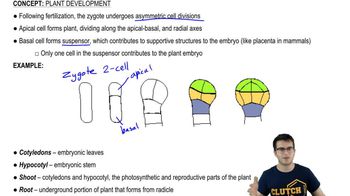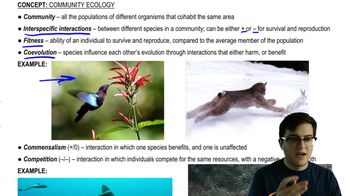The archenteron develops into a. the mesoderm. b. the endoderm. c. the placenta. d. the lumen of the digestive tract.
In humans, identical twins are possible because a. extraembryonic cells interact with the zygote nucleus. b. convergent extension occurs. c. early blastomeres can form a complete embryo if isolated. d. the gray crescent divides the dorsal-ventral axis into new cells.
 Verified step by step guidance
Verified step by step guidance
Verified Solution
Key Concepts
Identical Twins Formation

Blastomeres and Embryonic Development

Embryonic Cell Interaction

What structural adaptation in chickens allows them to lay their eggs in arid environments rather than in water? a. extraembryonic membranes b. yolk c. cleavage d. gastrulation
If an egg cell were treated with EDTA, a chemical that binds calcium and magnesium ions, a. the acrosomal reaction would be blocked. b. the fusion of sperm and egg nuclei would be blocked. c. the fast block to polyspermy would not occur. d. the fertilization envelope would not form.
Cells transplanted from the neural tube of a frog embryo to the ventral part of another embryo develop into nervous system tissues. This result indicates that the transplanted cells were a. totipotent. b. determined. c. differentiated. d. mesenchymal.
DRAW IT Each blue circle in the figure below represents a cell in a cell lineage. Draw two modified versions of the cell lineage so that each version produces three cells. Use apoptosis in one of the versions, marking any dead cells with an X.
